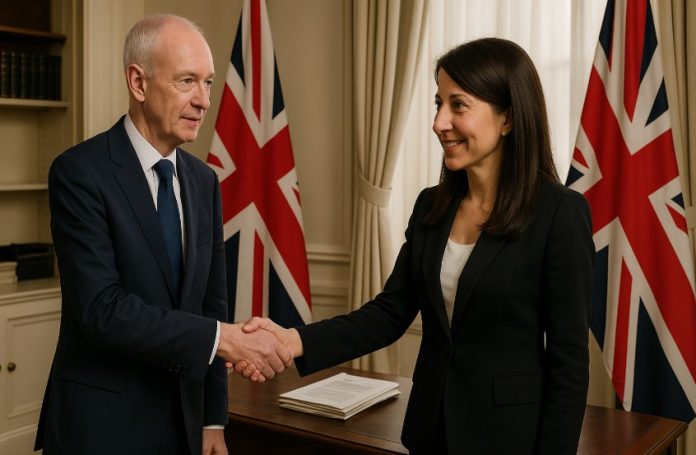Table of Contents
The United Kingdom has welcomed a new Secretary of State for Work and Pensions, as Pat McFadden replaces Liz Kendall following a Labour-led cabinet reshuffle.
The Department for Work and Pensions (DWP), one of the most vital arms of the UK government, is now under new leadership, and this transition could mark significant developments in the country’s welfare and employment policies.
With a long-standing political career, McFadden steps into a critical role that affects millions of citizens, from pensioners to job seekers and people with disabilities.
This article explores the implications of his appointment, his background, and the responsibilities he will now oversee.
Who Is the New DWP Secretary of State, Pat McFadden?

Pat McFadden MP was appointed Secretary of State for Work and Pensions on 5 September 2025. He has represented Wolverhampton South East in Parliament since 2005 and has held multiple ministerial positions during his career.
Before this latest appointment, he served as Chancellor of the Duchy of Lancaster from July 2024 to September 2025, managing key administrative and policy responsibilities across government departments.
McFadden is widely regarded as a pragmatic and experienced politician within the Labour Party. Known for his moderate stance, he has often focused on issues of economic fairness, public accountability, and social justice.
His background includes prior roles in the Department for Business and experience working in the Prime Minister’s policy unit during Tony Blair’s government.
His reputation as a policy-focused leader makes him a strategic choice for managing a complex department like the DWP, especially at a time when the government is aiming to reform social services and enhance public sector delivery.
Why Did Liz Kendall Step Down as DWP Secretary?
Liz Kendall’s term as Secretary of State for Work and Pensions lasted from 2024 to 2025. Her appointment followed Labour’s return to government and was part of a broader push to modernise the UK’s welfare and support systems.
Despite her relatively short time in the role, she was credited with initiating several foundational policy reviews, especially focusing on unpaid carers and support for working families.
However, her departure was not prompted by controversy or policy failure. Instead, it was part of a strategic reshuffle within the Labour cabinet, designed to optimise leadership placement across departments.
The reshuffle allowed for Pat McFadden to take over the department, leveraging his extensive experience in governance and economic affairs. Kendall remains a senior figure within Labour and is expected to continue in an influential policy role.
What Is the Role of the Secretary of State for Work and Pensions?
The Secretary of State for Work and Pensions is the chief political executive in charge of the DWP. This role encompasses oversight of a vast range of government services and funding schemes related to social welfare, pensions, employment, and disability support.
Core Responsibilities Include
- Setting the department’s strategic objectives
- Managing departmental expenditure
- Overseeing governance, planning, and performance reviews
- Reporting to Parliament and aligning departmental goals with national economic policy
- Leading responses to labour market shifts, demographic changes, and social inequalities
The position requires constant collaboration with other government departments, local authorities, and third-sector organisations. Decisions made at this level have direct consequences for millions of UK residents.
What Does the Department for Work and Pensions (DWP) Do?

The Department for Work and Pensions (DWP) is the UK government’s largest public service department, playing a pivotal role in the nation’s welfare, employment, and pensions infrastructure.
It manages a vast portfolio of services that are essential to the financial and social wellbeing of millions of individuals and families across the country.
A Core Function of the Welfare State
The DWP is at the heart of the British welfare state, ensuring that support is provided to people in need, from the unemployed and low-income earners to pensioners, carers, and individuals with disabilities.
Its core function is to administer welfare benefits and pensions while also working to help people find employment and become self-sufficient where possible.
The department is responsible for delivering most of the UK’s working-age, disability, and pension benefits.
In addition to providing financial assistance, it supports individuals through employment programmes, training schemes, and workplace integration efforts.
Services Provided by the DWP
The DWP’s services span a wide range of support areas. These services are delivered through a mix of digital platforms, regional offices (such as Jobcentre Plus), partnerships with local authorities, and third-party organisations.
Main Service Areas:
- State Pensions: The DWP administers the basic and new state pensions, ensuring that eligible retirees receive regular income. It also manages Pension Credit, which provides additional financial support to low-income pensioners.
- Working-Age Benefits: This includes major welfare programmes such as Universal Credit, Jobseeker’s Allowance (JSA), Income Support, and Employment and Support Allowance (ESA). These benefits help those who are unemployed, underemployed, or unable to work due to illness or other circumstances.
- Disability and Health-Related Benefits: The department handles assessments and payments for Personal Independence Payment (PIP), Attendance Allowance, and other forms of disability support. These are designed to help individuals with the extra costs of living with a long-term health condition or disability.
- Family and Children’s Support: The DWP is responsible for the Child Maintenance Service, which ensures financial contributions from non-resident parents, and helps families with low income through benefits like Sure Start Maternity Grant and support for lone parents.
- Employment Services: Through Jobcentre Plus, the department offers job search support, training opportunities, and incentives for employers to hire unemployed individuals. Programmes like Restart, Work Coach initiatives, and Access to Work assist jobseekers in finding and maintaining employment.
- Carers and Vulnerable Groups: The department also supports unpaid carers through Carer’s Allowance and offers tailored support for vulnerable groups such as care leavers, those experiencing homelessness, and individuals recovering from addiction or abuse.
Digital Transformation and Modernisation
Over recent years, the DWP has invested heavily in digitising its services to improve efficiency, transparency, and accessibility. Most benefit applications and updates can now be made online, and digital ID verification has been rolled out across multiple services.
However, the department still faces ongoing challenges in making services fully accessible to digitally excluded or vulnerable populations, including elderly citizens, people with complex disabilities, and non-native English speakers.
Targeted Support for Distinct Groups
The DWP’s work is structured around delivering tailored assistance to key demographic groups:
| Target Group | Type of Support Provided |
| People of Working Age | Universal Credit, job training, employment support |
| Pensioners | State Pension, Pension Credit, winter fuel payments |
| Disabled Individuals | PIP, ESA, Access to Work, mobility support |
| Families and Children | Child Maintenance, Sure Start Maternity Grant, parental support |
| Carers | Carer’s Allowance, respite care coordination |
| Employers | Recruitment incentives, workplace adjustments, training subsidies |
Each group is supported by dedicated services and teams, often coordinated through local Jobcentre Plus branches or online portals.
The goal is to provide both financial aid and long-term support that encourages independence and economic participation wherever possible.
Budget and Scope
The scale of the DWP’s responsibilities is reflected in its budget. As of recent figures, it is responsible for distributing over £250 billion annually, accounting for more than one-third of total UK government spending.
These funds support pensions, benefits, and welfare schemes affecting over 20 million people.
Interaction with Other Departments
While the DWP operates independently, it frequently collaborates with other government departments including:
- HM Treasury for budget allocation and funding of benefit increases
- Department for Education for skills development and youth employment schemes
- Department of Health and Social Care for integrated support on mental health and long-term care
- Local councils for the administration of housing benefit and discretionary welfare grants
These partnerships ensure that welfare policies are integrated and aligned with broader government priorities, such as reducing poverty, improving employment rates, and increasing public sector efficiency.
Continuous Reforms and Challenges
Despite its broad mandate, the DWP has been the subject of criticism over delays in benefit payments, complicated application procedures, and controversial assessment processes. Successive governments have introduced reforms aiming to:
- Simplify the benefits system
- Reduce fraud and overpayments
- Enhance fairness in eligibility criteria
- Improve service delivery for vulnerable groups
Future changes under Pat McFadden’s leadership may further address these concerns, particularly around the accessibility of benefits, accuracy of assessments, and the digitisation of public services.
How Has the DWP Leadership Changed Over the Years?

Leadership at the DWP has seen frequent changes, particularly in the past decade. These changes often reflect broader shifts in government and party leadership.
While some Secretaries have served for multiple years, others held the position for only a few months.
Here’s a second table highlighting key recent officeholders:
| Secretary of State | Term Duration | Political Party |
| Pat McFadden MP | 2025 – Present | Labour |
| Liz Kendall MP | 2024 – 2025 | Labour |
| Mel Stride MP | 2022 – 2024 | Conservative |
| Chloe Smith | 2022 | Conservative |
| Thérèse Coffey | 2019 – 2022 | Conservative |
| Amber Rudd | 2018 – 2019 | Conservative |
| Esther McVey MP | 2018 | Conservative |
| David Gauke | 2017 – 2018 | Conservative |
| Damian Green | 2016 – 2017 | Conservative |
| Stephen Crabb | 2016 | Conservative |
| Iain Duncan Smith MP | 2010 – 2016 | Conservative |
The repeated changes in leadership have influenced the pace and direction of reforms, sometimes leading to policy fragmentation or delays in implementation. McFadden’s appointment is seen as a chance to provide greater stability.
What Policies Might Pat McFadden Introduce or Change?
While specific policies from McFadden’s office are yet to be formally released, there are strong indications that he will focus on reform, efficiency, and inclusivity within the department.
Likely areas of policy emphasis include:
- Reviewing Universal Credit to improve accessibility and simplify claim processes
- Improving disability assessments and appeals mechanisms
- Strengthening support for working families, including access to childcare and in-work benefits
- Updating state pension frameworks to match economic conditions and longevity trends
- Expanding employment schemes for long-term unemployed and young people
The new Secretary may also seek to reduce administrative bottlenecks and deploy more digital infrastructure to support service delivery.
How Will This Leadership Change Impact UK Citizens?
McFadden’s leadership is expected to influence a wide range of stakeholders who depend on the DWP. His prior experience managing cross-departmental operations could result in faster service improvements and better policy coordination.
Potential impacts include:
- Faster resolution of benefit claims and appeals
- Enhanced support for people with long-term health conditions
- More equitable distribution of child and family benefits
- Better integration between employment programmes and employer recruitment needs
- Increased digital access to services for pensioners and remote communities
These changes could directly affect the quality of life for millions of people, especially those facing financial hardship or job insecurity.
What Reactions Has the Appointment Received?

The announcement of McFadden’s appointment has generally received positive commentary from the media, policy analysts, and civil service officials.
Public sector unions have expressed cautious optimism, citing his experience and collaborative leadership style.
Analysts also note that McFadden may play a stabilising role within the department, following years of frequent changes and policy realignment.
Opposition voices have called for transparency in his agenda, especially regarding Universal Credit and disability support.
However, few question his administrative competence or political alignment with Labour’s broader strategy.
What’s Next for the Department for Work and Pensions?
The months ahead will be crucial in defining the strategic direction of the DWP under McFadden. With the Labour government seeking to implement a wide-ranging social agenda, the DWP will likely be a centrepiece of reform efforts.
Short-term priorities may include:
- Consolidating ongoing pilot schemes in benefit digitisation
- Introducing legislative changes to improve welfare access
- Enhancing employer partnerships to reduce unemployment
- Redesigning support frameworks for carers and single parents
- Coordinating with Treasury for long-term pension sustainability
These reforms will need to be managed within fiscal constraints while addressing growing demand for public services. McFadden’s success will largely depend on his ability to deliver on both operational excellence and policy innovation.
Conclusion
Pat McFadden’s appointment as the new DWP Secretary of State represents more than just a personnel change it signals a potential reinvigoration of the UK’s welfare policies under Labour leadership.
His extensive experience, combined with a practical approach to governance, sets the stage for thoughtful and impactful reforms.
As millions rely on the DWP for essential services, the importance of competent and visionary leadership cannot be overstated.
While challenges persist, McFadden has the opportunity to steer the department toward greater efficiency, fairness, and responsiveness to citizens’ needs.
Frequently Asked Questions (FAQs)
What is Pat McFadden’s political background?
Pat McFadden has been an MP since 2005 and served in multiple governmental roles, including as a minister in the Department for Business and as Chancellor of the Duchy of Lancaster before his DWP appointment.
What qualifications does the DWP Secretary of State need?
The role is a political appointment; qualifications are based on political experience, leadership capability, and understanding of welfare policy, not formal academic credentials.
How does the DWP affect everyday UK citizens?
The DWP administers state benefits, pensions, and employment services, affecting millions of people including jobseekers, pensioners, families, and disabled individuals.
Will Pat McFadden change Universal Credit policies?
Although no formal statement has been made, McFadden is expected to refine and improve Universal Credit, especially regarding accessibility and processing efficiency.
Who does the DWP report to?
The Secretary of State for Work and Pensions reports directly to the Prime Minister and Parliament, ensuring that departmental strategy aligns with government objectives.
What was Liz Kendall’s legacy at the DWP?
Liz Kendall focused on modernising benefits and support for carers. Her short tenure was marked by strategic planning but limited long-term implementation.
Where can I find official updates about DWP changes?
You can visit the official Gov.uk DWP Minister Page for announcements and updates.


